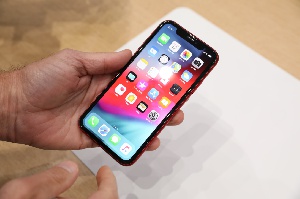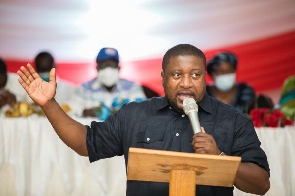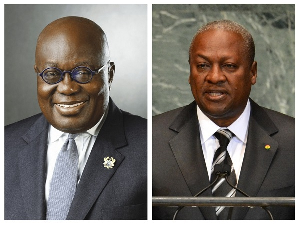Recently, Cecilia Dapaah, Ghana’s sanitation and water resources minister, was heard chastising an intern journalist with Adom FM.
If she had just thought for a moment that the intern could be a mystery client, she certainly would have answered the caller whom she did not know more professionally.
The problem however was caused by Adom FM, who decided to record the minister without her consent, kept the audio for more than a week, and exercised a poor editorial decision to publish it.
Funnily enough the conflict has been resolved the ghanaian way – the minister gave the young lady a boon with a photo opportunity and some chocolates – whilst the sanitation problem which occasioned the phone call remains completely untouched!
“Part of the ghanaian problem is that we do not have a culture of reading and organising academic discussions where scathing and robust critiques based on principles are a tradition,” our mentor has observed.
Hence speeches by traditional leaders, elected officials and other professionals often contain clangers.
It is distressing that these days we hear in the news of some chief or minister expressing public anger and resorting to name calling publicly.
We shall not give specific examples here.
But let us reference His Majesty King Mohammed VI on his address to his citizens on the august occasion of his 20th anniversary of enthronement this week.
The king was frank as we all must be with each other.
He laid a clear path ahead for his nation’s development, and even when he had to call out detractors, he refrained from mentioning names but addressed the principles where they had been found wanting and to which he exhorted them to aspire.
His Majesty used the last few paragraphs of his speech to bless and inspire identifiable groups including his royal troops for preserving the peace and security of the kingdom.
He then gives his citizens the final boon thus:
“Almighty God says: ‘Allah has promised those who have believed among you and done righteous deeds that He will surely grant them succession (to authority) upon the earth, just as He granted it to those before them’. True is the Word of God.”
Certainly, his justified anger did not extend to sending out special forces, myrmidons or apparatchiks to go and teach anybody “a lesson”, as often happens around here.
About two weeks ago, Nana Kwesi Agyeman IX, Paramount Chief of Lower Dixcove, was abducted and allegedly tortured by rivals over a land boundary dispute.
How does this happen in “a vibrant democracy”?
Have the perpetrators learnt lawlessness from the central government?
How come we have fallen so low?
In Ghana chiefs have traditional training schools formally established within their royal households.
Attendees are trained to carry themselves properly so that the very aura around them becomes a blessing.
And when they speak to give blessings or wave at their subjects the people feel a real unifying moment and other wholesome impulses.
Take Nuumo Yemo Broni, the La Kpa Wuolomo for example.
This priest embodies the kpamo or covenant between the deity and the La people of Accra.
On Homowo Sho, the festival Wednesday, he sprinkles holy water – a boon – on the people, and they in turn receive it with joy and cheer.
Women looking to conceive, for example, will be seen receiving the boon and reciting blessings unto themselves.
In other realms, chiefs sit in palanquins and wave wands to give boons to their subjects while dispelling evil.
The various stool rooms contain many sacred objects which impart blessings upon those who administer their associated rituals.
So sacred are these places and objects that no one goes there unless specially selected.
Some chiefs swear on symbolic swords.
If a chief’s utterances go against tradition then we know the boon from his/her state sword may have been weakened through a grievous fault or error.
On the national front, our president holds the state sword to swear his oath of office.
Our parliamentarians also swear on the bible and other sacred books and objects – objects which are supposed to impart blessings upon them and set them apart for national duties.
Ought we not then to reflect on these rituals and the boons they give us?
Given the current state of affairs of our country, it is obvious that the boons are fast leaving our leaders.
No doubt we need public speaking boons; so let them flow.
And ghana certainly needs a sanitation boon immediately.
Feedback; ato@writersghana.com; www.writersghana.com; LinkedIn, Isaac Ato Mensah; Instagram, @atomenswriters; Twitter, @Atomens; Facebook, Isaac Ato Mensah; Telegram, Isaac Ato Mensah; Quora, Isaac Ato Mensah. WhatsApp (+233) 020 022 0353.
Writers and Shakespeares Ghana Limited exist to be a moral and intellectual guide to the best practice of PR and integrated communications around the world, beginning with Ghana.











